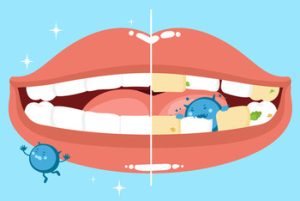Bad breath is one of those awkward problems that can catch anyone off guard. Whether it’s a morning wake-up call or an unexpected odour during a conversation, breath smells can impact your confidence, relationships, and overall well-being. But what causes it, and more importantly, what can you do about it?
In this article, we’ll explore the various bad breath causes, also known as halitosis, and share practical ways to maintain a fresher mouth and cleaner-smelling breath. We’ll also look at related health issues and everyday habits that can help improve your oral hygiene and overall confidence.
What Exactly Is Halitosis?
Halitosis is the clinical name for persistent bad breath that doesn’t go away with routine brushing or mouthwash. While everyone may experience temporary mouth odour, persistent or recurring bad breath often points to an underlying cause that requires attention. It can come from inside the mouth or be linked to health conditions affecting the throat, nose, stomach, or lungs.
The Most Common Culprit: Poor Oral Hygiene
One of the leading causes of bad breath is poor oral hygiene. If you’re not brushing your teeth and tongue regularly or skipping dental floss, food particles can linger in your mouth. These leftover particles become food for the natural bacteria in your mouth, leading to the release of unpleasant-smelling sulphur compounds. If brushing and flossing are neglected, a sticky film known as plaque accumulates on your teeth and gums. If left alone, this buildup can harden into tartar, causing gum disease and further worsening your breath odour.
Good oral hygiene is your first line of defence. This includes:
- Brushing your teeth at least twice daily
- Using dental floss to eliminate trapped food particles
- Cleaning your tongue with a tongue scraper
- Rinsing with water or an antibacterial mouthwash
- Regular dental check-ups for professional cleaning and general dentistry advice
Could It Be Something You Ate?
Yes, certain foods are known to leave a lingering smell. Garlic, onions, coffee, and spicy dishes can all cause your breath to smell unpleasant for hours after eating. That’s because these foods enter your bloodstream and are released through your lungs when you breathe out.
While these effects are temporary, brushing and drinking plenty of water can help lower the intensity. If your breath smells persist long after your meal, however, something else might be going on.
The Problem with a Dry Mouth
Saliva plays a key role in keeping your mouth clean by flushing out food debris and harmful bacteria. When you have less saliva, your mouth dries out, allowing more bacteria to flourish. This leads to an increase in breath odour.
A dry mouth, also known as xerostomia, can result from a variety of factors, including:
- Dehydration
- Smoking or using tobacco products
- Certain medications
- Sleeping with your mouth open
- Health conditions like diabetes
If dry mouth is something you deal with often, try drinking plenty of water throughout the day, chewing sugar-free gum to stimulate saliva, and speaking with a healthcare professional for long-term solutions.
Gum Disease: A Silent But Serious Cause
Bad breath that doesn’t go away could be an early sign of gum disease. This infection of the gums and bone supporting the teeth is often caused by long-term plaque build up. In the early stages, it’s known as gingivitis, which may present as swollen, red, or bleeding gums.
If not treated early, it can advance to periodontitis, a more serious condition that may result in bone loss, loose teeth, and even tooth loss. Both stages of gum disease are major causes of halitosis due to the bacteria and decay involved.
Regular dental check-ups and consistent oral hygiene practices are key to preventing and managing gum problems and symptoms before they impact your breath or overall health.
Could It Be Your Tongue?
The tongue can hold onto bacteria and food debris, especially in the crevices toward the back. This is often a neglected area during brushing. A coated tongue can be a direct source of mouth odour and contribute to overall bad breath.
Using a tongue scraper or softly brushing your tongue with a toothbrush helps eliminate bacteria and supports fresher breath.
Tonsil Stones: Small But Potent
Ever heard of tonsil stones? These are small, white or yellowish lumps that form in the crevices of the tonsils. Made from food particles, mucus, and bacteria, they can emit a strong odour when dislodged.
While they’re not usually harmful, they can be a hidden cause of persistent halitosis. If you frequently notice a bad taste in your mouth or small foul-smelling particles, this might be worth discussing with a doctor.
Other Medical Conditions That Cause Bad Breath
- Gastroesophageal reflux disease (GERD): Stomach acid rising into the oesophagus can leave a sour or unpleasant taste and smell.
- Postnasal drip: Mucus from the nose and throat can provide fuel for bacteria, especially during allergies or sinus infections.
- Mouth sores or infections: Ulcers, cuts, or foreign body presence in the mouth can alter your breath smell.
- Throat infections: Infections in the tonsils or throat area can produce a foul odour.
- Tooth decay: Cavities can trap food and bacteria, creating lingering smells.
If your dentist has ruled out dental issues, but you still struggle with halitosis, it’s worth seeing a doctor to explore whether an underlying cause is contributing to the problem.
Lifestyle Habits That Worsen Breath Smells
In addition to medical factors, certain every day habits can also contribute to persistent bad breath. These include:
- Skipping meals or following low-carb diets that promote ketone production
- Drinking too much alcohol, which dries the mouth
- Using tobacco products, which stain the teeth, irritate the gums, and reduce saliva production
- Poor hydration habits that reduce saliva flow
Making lifestyle changes like quitting smoking, cutting down on alcohol, and staying hydrated can support both better oral hygiene and fresher breath.
When Should You See a Dentist or Doctor?
While occasional bad breath is normal, ongoing issues should not be ignored. You should seek help from a dentist or healthcare professional if:
- You’re experiencing ongoing bad breath even though you maintain good oral hygiene.
- You begin to experience signs such as swollen or bleeding gums, a dry mouth, or tooth pain.
- Your breath smells worse in the morning and doesn’t improve during the day.
- There’s a foreign body sensation or visible growth in the mouth or throat.
- You experience other issues like a sore throat, stomach discomfort, or postnasal drip.
Dental professionals can help identify oral causes such as tooth decay, gum disease, or tonsil stones, while your GP can investigate deeper health conditions that may be playing a role.
Easy Everyday Tips to Keep Your Breath Fresh
Here are a few straightforward and effective tips to help prevent or minimise bad breath:
- Brush your teeth at least twice a day, and ideally after meals
- Use dental floss daily to remove hidden food particles
- Clean your tongue daily with a tongue scraper
- Drink water frequently to prevent dry mouth
- Avoid or limit certain foods known to cause mouth odour
- Chew sugar-free gum to stimulate saliva flow
- Visit your dentist twice a year for check-ups and cleaning
Keeping your mouth clean isn’t just about a great smile; it’s about protecting your health and confidence, too.
Final Thoughts: You Don’t Have to Live With Halitosis
Bad breath causes are fairly common, but that doesn’t mean they should be ignored or taken lightly. From improving your brushing routine to checking for underlying causes, there’s always something you can do to tackle mouth odour.
If you’ve been struggling with halitosis and can’t quite figure out why, don’t hesitate to reach out to Available Dental Care at (02) 4601 3828. With proper care, you can maintain fresh breath, improve your oral health, and smile with confidence each day.
References
Mayo Clinic. (n.d.). Bad breath odor (halitosis). Retrieved from https://www.mayoclinic.org/diseases-conditions/bad-breath/symptoms-causes/syc-20350922
Colgate. (n.d.). What is good oral hygiene? Retrieved from https://www.colgate.com/en-us/oral-health/adult-oral-care/what-is-good-oral-hygiene
Cleveland Clinic. (n.d.). Acid reflux (GERD). Retrieved from https://my.clevelandclinic.org/health/diseases/17019-acid-reflux-gerd









